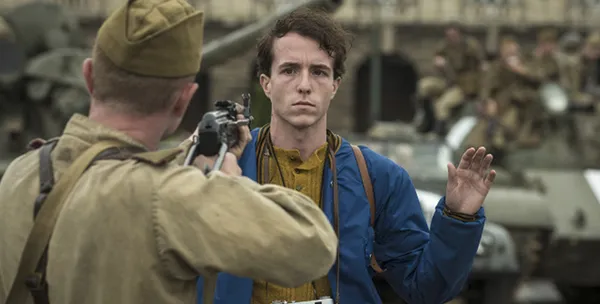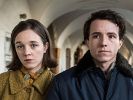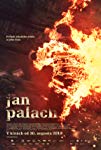Eye For Film >> Movies >> Jan Palach (2018) Film Review
Jan Palach
Reviewed by: Jane Fae

Some films, particularly biopics that deal with the lives of significant national figures, will receive a very different critical reception according to where they are shown. That is inevitable.
Lech Walesa, once a key player in Polish Liberation, is now largely unknown to filmgoers 30 and under, born outside of Eastern Europe. Charles De Gaulle, a towering figure in French political history during the Second World War and beyond, is likely now celebrated, outside France, mostly as airport.

So it is with Jan Palach, a film telling the story of a young Czech student of that name, who died, at his own hand, as act of protest against national aggression. Who?
It is a story I have known all my life. But then I am of a certain age. Old enough to have been holidaying with my parents in Czechoslovakia in 1969 – the year Palach killed himself. I am at least 50 per cent Slav – OK, Polish, not Czech, but that has meant I have always been more aware of what went down in that part of the world than the average Brit. And through the Seventies and Eighties I was involved in campaigning – in the UK – for the liberation of Eastern Europe.
But honestly, did you even know his name before you clicked on this review, let alone any reason why his life, and death, were significant?
The film, from award-winning Czech Director Robert Sedlácek, is a low-key, muted look at the life of Palach. It begins with his time working away from home, helping peasants dig out irrigation systems in the Soviet Union, carries on through the invasion of his home country by Soviet forces and finally focuses on his fateful decision, in December 1968, to end his life as statement against that invasion.
For those not familiar with the history of those times, in 1968, a thaw in Czechoslovak politics blossomed into the liberation of the Prague Spring. The Czechoslovak communist party, under Alexander Dubcek, started to unpick some of the more repressive elements of the Communist regime, seemingly with the approval of the Soviet Union. But in August 1968, Russian troops crossed the border, bringing all liberalisation efforts into abrupt halt – and then throwing them into reverse.
The people resisted. But there was no armed uprising. The country's leaders, understanding the lessons of Hungary in 1956, refused to pit ordinary people against regular troops. So resistance was passive, restricted to sloganising, hundreds of ordinary people sitting down in the road in front of tanks, non-co-operation and the removal of road signs... And slowly, inevitably, even that faded away, with hope replaced by a sullen oppressive normality.
The film follows Palach (Viktor Zavadil) through the last couple of years of his life, from ordinary teen taking part in volunteer activities, through to aspiring student to loner and national hero: to his role as literal “Torch Number 1”, lighting a flame of protest against soviet occupation.
The film is both intense and frustrating. It tells the story of that fateful year, not in terms of grand political manoeuvrings, but of people on the street. People marching, protesting, standing up against overwhelming force. It captures, too, what seems a very plausible exposition of the student politics of the time – young radical people railing against the unfairness of it all, but in the end, inevitably, putting away their banners and returning to their studies.
Not cowardice but resignation, and the realisation that nothing they do can make a difference. Moving through all this, ghost-like, is Palach. He is clearly disturbed by events, shows signs of wanting to make a stand, takes part in marches and is beaten for his troubles. And yet, and yet...this is where I suspect the divide will come become national audiences. Sedlácek's treatment of his subject matter is near documentary in style. There are plenty of little details – from the use of Asian troops by the Soviet Union to TV footage of an infamous ice hockey match between the Czech and Soviet teams at the winter olympics of 1968 – that a Czech audience will recognise instantly.
His shaping of the narrative is there, but it is light touch in the extreme. Here and there you can spot differences between Palach and his fellow students. He stands out as slightly more serious, that bit more prepared to stand up to authority. He is resentful of a party system that destroyed his father, resentful too of his mother, who joined the party (and now regularly reads his private mail as part of her party duties) and dismissive of what she describes as “pragmatism”, which enables him and his brother to prosper even after his father's death.
But otherwise, he is an absence. The film takes us through the momentous events of 1968, creates a dramatic backdrop to Palach's decision and never quite explains, beyond a few hints, that he may have been motivated by political suicides against the communist regime in Poland and against the US presence in Vietnam in the Far East.
The issue, as Sedlácek makes clear in a recent interview, is that we simply do not know. No one who knew Palach knew him very well: and no two narratives quite agree. So he remains an enigma: an immensely important figure within the Czech national mythos – and at the same time a complete unknown.
A modern-day saint, Christ-like, almost. In that, the film has much in common with films dealing with early Christianity, with a strong focus on the (known) historic backdrop, through which our protagonist moves in mysterious ways, playing his cards close to his chest, never truly knowable.
That, in the end, is likely to be the divide. Sitting in an audience of (mostly) Czech people, it was clear that this story, this film, cut deep, moving many to tears. As much, perhaps, because it highlights a moment of national trauma. For an audience less steeped in the events of that time, this film may be frustrating, a puzzle, much like Palach himself. Very well done but still, a story about other people's and other times that never quite connects with our present narrative.
Reviewed on: 18 Jan 2019
















